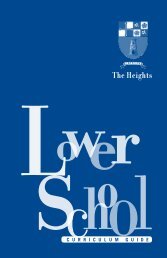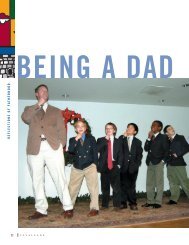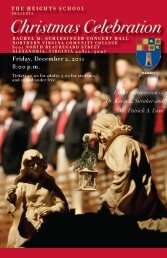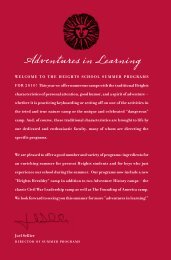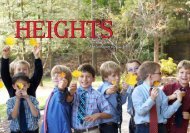The Heights School
The Heights School
The Heights School
You also want an ePaper? Increase the reach of your titles
YUMPU automatically turns print PDFs into web optimized ePapers that Google loves.
Art<br />
<strong>The</strong> Art Department at <strong>The</strong> <strong>Heights</strong> <strong>School</strong> follows a classical approach to art,<br />
stressing that art should be based in reality and beauty. Students learn the<br />
discipline of drawing using perspective and using color appropriately. Several<br />
students excel and develop their natural talents. Carpentry and AP Art History meet<br />
daily for a full credit.<br />
C o u r s e o f f e r i n g s<br />
n Art<br />
n Art II<br />
n Carpentry and Practical Building Skills<br />
n AP Art History<br />
Computers<br />
<strong>The</strong> <strong>Heights</strong> <strong>School</strong> offers two levels of computer programming, Computers I and<br />
Computers II AP. <strong>The</strong>se elective classes are open to juniors and seniors who are<br />
interested in learning about computer programming. Computer programming<br />
helps the boys to think analytically and reinforces the benefits of math classes.<br />
In addition, the Internet is available in the library for students to use in a closelymonitored<br />
environment. <strong>The</strong> <strong>Heights</strong> <strong>School</strong> has refrained from relying too heavily<br />
on computers in education, especially in the lower grades. While computers can<br />
certainly be a very useful tool, the key academic struggles that young students<br />
face relate not so much to accessing information in an efficient manner as to<br />
processing and synthesizing the information that is available to them from so<br />
many sources. A liberal arts education must first help students to learn how to be<br />
critical readers, thinkers and writers.<br />
Music<br />
As one of the four subjects in the quadrivium, music is integral to a liberal arts<br />
education. In order to truly be well educated, a man must achieve an integration<br />
of his passions with his reason. Music educates the passions and, when done<br />
properly, helps one to place them at the service of right reason. Education in<br />
music works on many levels, helping to spur intellectual and moral development<br />
in a manner that complements other academic subjects.<br />
Students in the Upper <strong>School</strong> have the option of choosing a cappella singing as<br />
an elective class. <strong>The</strong> a cappella program has grown to approximately 60 Upper<br />
<strong>School</strong> students who perform admirably in competitions and at several school<br />
functions, including the Christmas concerts and solemn Masses.<br />
In addition, the Music Department offers formal classes in Music History and<br />
AP Music <strong>The</strong>ory on alternating years. <strong>The</strong>re are also band programs in which<br />
several Upper <strong>School</strong> students participate. Each music course counts for a full<br />
credit except band, which counts for half of a credit.<br />
C o u r s e o f f e r i n g s :<br />
n A cappella I<br />
n A cappella II<br />
n A cappella III<br />
n A cappella IV<br />
n Band (1/2 credit)<br />
C o u r s e o f f e r i n g s :<br />
n Computers I<br />
n Computers II<br />
18 T h e H e i g h t s S c h o o l U p p e r S c h o o l C u r r i c u l u m G u i d e 19



